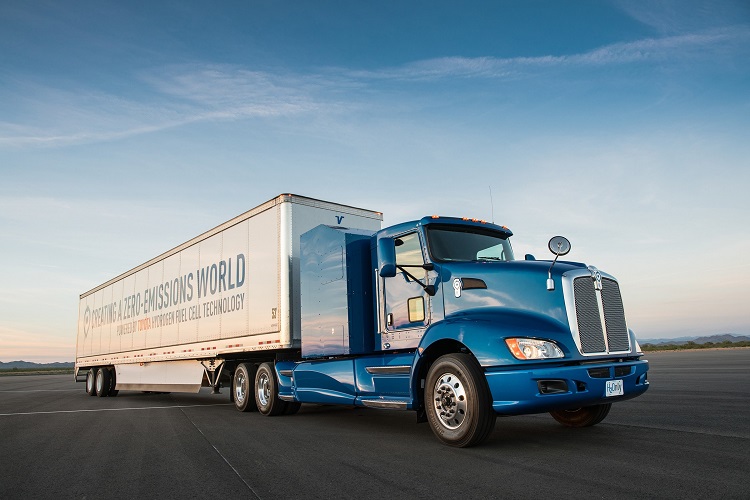When it comes to a hydrogen powered truck, Toyota is serious.
On Wednesday Toyota introduced a gigantic, hydrogen powered truck that is going to carry freight around the Port of LA. The 18-wheeler hydrogen powered truck is a part of a much larger feasibility research project that is going to evaluate just how the emerging technological innovation is effective in heavy duty trucks.

The articulated hydrogen powered truck is driven by two Mirai fuel-cell stacks and a compact 12 kWh battery pack to assist with larger performance needs. It undoubtedly delivers a punch; the big rig produces a bit more than 670 horsepower, as documented by Toyota.
The Japan-based corporation is going to also launch 100 hydrogen powered buses at the Tokyo Olympic games to move athletes as well as spectators.
“The key to making any new fuel work is to have adoption of that fuel across a wide spectrum of applications,” Craig Scott, the director of Toyota’s advanced technologies group, told Business Insider.
Toyota has been creating its fuel-cell technologies for more than twenty years. In October 2015, Toyota commenced retailing its hydrogen powered Mirai car in California for just under $US60,000. So far, the carmaker has sold 1,500 of them.
But Toyota is not the only corporation serious about substituting dirty diesel powered trucks.
A new venture named Nikola Motor is planning to provide its hydrogen powered truck to the market by 2020. Mercedes is presently evaluating its own electric powered articulated vehicle in Germany and Tesla plans to release an all electric semi-trailer and pick up vehicle inside of two years.
Elon Musk (Founder Of Tesla Motors) is a vocal adversary of hydrogen powered cars and other vehicles, having gone as far as calling them “extremely foolish.” His principal issue is that it really is extremely complicated to make and store hydrogen and at this time there are obvious challenges with hydrogen powered fuel-cell cars and trucks, principally the absence of national infrastructure to underpin them.
Presently there are a mere 34 hydrogen re-fuelling gas stations in the whole of the USA. In contrast, right now there are almost 16,000 electric battery charging stations, and even then the owners of battery-powered electric motor vehicles still feel charging to be the main headache owning such a vehicle.
Supporters of hydrogen powered vehicles are going to claim that fuel-cells are inherently a superior technological innovation, even with the issues of needing to construct significant national infrastructure to service the vehicles.
Firstly they argue that hydrogen powered motor vehicles offer significantly greater ranges compared to their electric powered vehicle competitors. In addition, it requires only a couple of minutes to fill up a hydrogen gas tank, whilst charging a car electric battery usually takes at the very least half an hour even using a rapid charger.
Toyota, Honda and General Motors are all engaging with state government bodies to offer hydrogen-powered motor vehicles to the Northeast of the US. Honda presently rents its hydrogen-powered Clarity sedan in The state of California, however it has only been on the marketplace since December 2017.
Honda and General Motors plan to bulk manufacture fuel-cells by 2020 as part of an $US85 million joint venture.
Hydrogen Powered Fuel-cell technology may well still be an emerging arena, but significant brands in the automotive sector are seeking to transform that.
SOURCE: Business Insider Com

